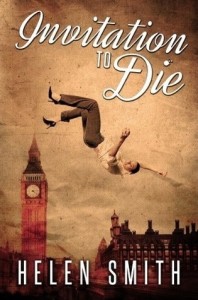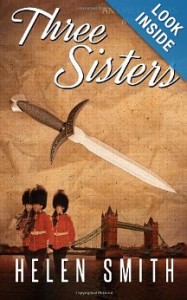From the Booking Desk:
BOLO Books is excited today to welcome Helen Smith to the blog. If you stopped by yesterday, you likely saw the BOLO Books review of her latest novel, Invitation to Die. Today, we get answers to some of those burning questions, including why a book blogger had to die.
______________________________________________________________________
BOLOBooks: Invitation to Die started out as a Kindle Serial. How was writing a novel in shorter sections different from writing a book that is going to be published in full? Did you have any unique challenges with the serial format?
Helen Smith: I had written the book in the usual way. After I delivered the manuscript, my editor at Thomas & Mercer suggested it might be suitable for serialization in the Kindle Serials program. When we looked at it, it broke down neatly into five episodes. These were published at fortnightly intervals for US readers who signed up for them, before being published as a full ebook and a paperback in the US and the rest of the world in May. However most of the authors writing Kindle Serials are publishing each episode as they finish it.

BOLOBooks: The setting for the novel is a book conference. What are your thoughts about actual conferences, such as Bouchercon? And why did you think a conference was a good setting for a murder mystery?
Helen Smith: I went to Bouchercon for the first time last year and I loved it. As soon as I came home, I booked to go to the next one. I wasn’t sure what to expect but I found it very friendly. My experience at Bouchercon prompted to me to go along to CrimeFest in Bristol in the UK in May this year, and I’ll also be at Harrogate in July.
A conference is a great setting for a murder mystery because a group of people are brought together in one place and have to stay there for a specified length of time, and it’s plausible to suggest there would be rivalries and secrets that might lead to murder. All the romance authors I’ve met have been lovely, but I decided to set Invitation to Die at a romance authors’ conference because I thought if it was a crime writers’ conference, they’d want to solve the mystery and Emily wouldn’t get a chance to do it.
BOLOBooks: Book bloggers play a major role in Invitation to Die. How do you think bloggers fit into the ever-changing landscape that is publishing today?
Helen Smith: They’re a very welcome addition. I have always relied on friends for recommendations about what books to read. I still do, but now I also rely on book bloggers – they function as virtual book friends. People reveal a lot about themselves if they update their blogs frequently, so, in the case of book bloggers, you get to know their tastes and trust their opinions. You know they’re blogging about books because they love reading and want to share their discoveries.
As a writer, book bloggers have been very good to me over the years by agreeing to read and review my books. I know it’s time-consuming to read and review books, and bloggers have to fit it around their other commitments, and of course they receive no compensation, beyond a few pennies as Amazon affiliates if they belong to that program… and they only use that to buy more books.
So, I’m grateful to book bloggers both as a reader and as a writer. I did wonder if it was a good move, career-wise, to lure an American book blogger to her death in Invitation to Die. But fortunately all the bloggers who have reviewed the book so far have been good-humored about it. Long may book blogging continue.
BOLOBooks: There is mention of a One Star Club in the novel. Basically, it is an organized group whose sole purpose would be to give one star ratings to various products. Do you think that the star rating system is an effective tool in general?
Helen Smith: When I’m buying a piece of equipment – anything from a printer to a camera to copper slug rings (to keep slugs and snails away from my plants) – I read the 5* reviews and the 1* reviews and find them useful. The best reviews comment on the functionality of a product and help me make up my mind about whether or not to buy. The star ratings are less useful for a book or a holiday because the reader or holidaymaker is rating their experience – and whether it’s good or bad will often depend on expectations as well as their likes and dislikes or even their mood rather than the quality of the writing. Without knowing anything about the person who is rating the book, it’s difficult to know whether you’ll react in the same way.
As a reader, I tend to ignore the ratings on a book and depend on recommendations from friends or book bloggers to help me decide whether or not I’ll like it. As a writer, I suddenly forget that it’s OK to ignore the 1* reviews – I’m horrified by them. I feel bad for the readers who haven’t enjoyed my book, in the same way I’d feel bad if I cooked a meal for someone at my house and they didn’t like the food.
Authors are often advised not to look at their reviews on Amazon or Goodreads – the reviews are written for other readers, after all, not for the author. It’s good advice, but it’s hard to follow because I do want to know what readers think of my books, especially when they’re newly published.
BOLOBooks: Invitation to Die has a very traditional structure. The first chapter introduces all of the major characters and the final chapter features a gathering of all those characters in preparation for the killer’s reveal. This feels very Agatha Christie-like to me. Are you a fan of her work? Did any other authors inspire you when you were developing this structure?
Helen Smith: I love Agatha Christie. Her books were the first grown-up books I read when I was younger. Because I liked Agatha Christie, I tried to find other books in the same style, and I also read Dorothy L Sayers and Ngaio Marsh. Discovering one author through the love of another is still one of the great joys of reading, for me. And Miss Marple is still one of my all-time favorite detectives, along with TinTin and the Scooby Doo crew – imagine riding around in a Mystery Machine! If I could find some like-minded people to join me, I’d love to do that now.
BOLOBooks: I’m in. Just let me know where the mystery machine is picking me up.
I know that this is the first in a series, so what is next for our accidental investigator, Emily Castles?
Helen Smith: She’s heading to Torquay. A psychic has predicted that a magician called Edmund Zenon will die from drowning in Torquay over the Easter weekend. Edmund has offered to pay £50,000 to anyone who can prove the existence of the paranormal during a conference called Belief and Beyond. Dr. Muriel is one of the delegates and Emily is hired, on her recommendation, as what her friend mischievously calls a “future crimes investigator” to write a report on the prediction and its outcome. Soon, of course, they’re mixed up in murder…
Beyond Belief will be out in January 2014. If readers have enjoyed Invitation to Die and they’re eager for more stories featuring Emily, there are two short novellas available: “Three Sisters” and “Showstoppers.” These are both set in London.
BOLOBooks: If forced to choose only one format for all your future reading, which would you choose: Hardback, trade paperback, mass-market paperback, or e-book? And why?
Helen Smith: I’m interested in the content rather than the delivery, but if I had to choose, I’d choose e-books. I now need reading glasses but I don’t have to use them with my Kindle – I can just increase the size of the type. I wasn’t sure I’d like using an ereader and I thought about it for a long time before I bought one. The convenience of being able to buy a book at any time of the day or night, the low price of ebooks and the portability were all considerations that made me decide to buy. I like all these things. But it’s the ability to increase the size of the type that would make me miss it if I had to do without my Kindle.
Thanks for the thoughtful questions. I really enjoyed answering them.
BOLOBooks: Thanks for stopping by Helen. I will see you at Bouchercon in Albany!
